Accolades

Bioethics Researchers Elected Fellows to Hastings Center
Lisa S. Parker and Robert M. Arnold were recently elected fellows to The Hastings Center, a nonpartisan, nonprofit organization of research scholars studying ethical questions in medicine, science and technology that help inform policy, practice and public understanding. They are two of 12 newly elected fellows recognized for their outstanding accomplishments informing scholarship and public understanding of complex ethical issues in health, health care, science and technology.
Parker is the Dickie, McCamey & Chilcote Professor of Bioethics at Pitt, where she directs the Center for Bioethics and Health Law. She is also a professor of human genetics in Pitt's Graduate School of Public Health.
Arnold is a distinguished service professor of medicine in the division of general internal medicine and chief of the section of palliative care and medical ethics at Pitt. He also is a member of the Center for Bioethics and Health Law where he coordinates the clinical ethics education programs.

Ryan McGarry (MED ’09) Produces New Netflix Original Series
The new Netflix documentary series “Pandemic: How to Prevent an Outbreak” is earning buzz. Fast Company called it “required viewing,” saying it “couldn’t have come at a more crucial time with the recent coronavirus outbreak.”
Ryan McGarry (MD ’09), an emergency medicine doctor, Pitt School of Medicine alumnus and cinematographer, is behind the series as an executive producer. This summer, he invited Pitt Anthropology Chair Bryan Hanks to play a role in setting the stage for the series: The first episode opens at an unmarked grave site near Pittsburgh where an unknown number of bodies are buried—victims of the 1918 pandemic flu. Hanks and a team of Pitt students use ground-penetrating radar to estimate about how many people were buried there.
McGarry, now a faculty member at Cornell University, said he wanted an excuse to get back to Pittsburgh and feature Pitt experts in this docuseries. Check out the new show on Netflix and learn more about his first big experiment, Code Black, in Pitt Med magazine.

Jamie Hanson Wins American Psychological Foundation Award
Jamie Hanson, assistant professor in the Department of Psychology in the Kenneth P. Dietrich School of Arts and Sciences and research scientist at the Learning Research and Development Center (LRDC), is the recipient of the 2019 American Psychological Foundation Robert L. Fantz Memorial Award.
The Fantz Award recognizes young researchers in psychology who have accomplished basic scientific research or scholarly writing in perceptual-cognitive development and the development of selective attention, and have investigated and written about the development of individuality, creativity and free-choice of behavior.
Hanson’s research focuses on how children and adolescents learn about their environments, how early life stressors impact their developing brains, and how brain changes can result in negative outcomes. His program consists of working with families, collecting data, connecting with communities and sharing information about brain and behavioral development.

Pitt Collaboratory Releases Paper on Water Issues
The Pittsburgh Collaboratory for Water Research, Education, and Outreach has released a white paper outlining key challenges to water quality research, monitoring and improvement in the region. The collaboratory, founded by faculty out of the Department of Geology and Environmental Science in the Kenneth P. Dietrich School of Arts and Sciences, recommended coordinated regional efforts to test waterways for a broader range of pollutants and increased public awareness surrounding water quality issues. The paper, “Water Quality in Southwestern Pennsylvania: Knowledge Gaps and Approaches,” is the second of three examining knowledge gaps surrounding water issues within the region.

Peter Strick Honored for Brain Research
Peter Strick, founding scientific director of the University of Pittsburgh's Brain Institute, was selected for a 2019 Krieg Cortical Kudos Discoverer Award in recognition of his contributions to the understanding of the cortical circuits involved in motor control.
He was presented the award by the Society for Neuroscience at the Cajal Club in Chicago. Each year, neuroscientists at senior, intermediate and beginning stages in their careers are honored by the society for outstanding research on the structure and connections of the cerebral cortex.
Strick’s research focuses on four major areas: the generation and control of voluntary movement by the motor areas of the cerebral cortex; the motor and cognitive functions of the basal ganglia and cerebellum; the neural basis for the mind-body connection; and unraveling the complex neural networks that comprise the central nervous system.

Pediatrics Researcher John V. Williams to be Presented Award for Scientific Contributions
John V. Williams was recently announced as the recipient of the 2020 Norman J. Siegel Outstanding Science Award by the American Pediatric Society for “his considerable contributions to pediatric science.”
Williams is the division chief of pediatric infectious diseases at UPMC Children's Hospital of Pittsburgh; Henry L. Hillman Endowed Chair in Pediatric Immunology; professor at the University of Pittsburgh School of Medicine; and director of the Institute for Infection, Inflammation, and Immunity in Children (i4Kids).
Williams is an international leader in the field of respiratory virus biology, particularly human metapneumovirus (HMPV), and a recognized researcher and contributor to leading scientific journals. He will be presented the award on May 3 during the APS Presidential Plenary at the Pediatric Academic Societies 2020 meeting in Philadelphia.
Read more about Williams and the American Pediatric Society's honor.
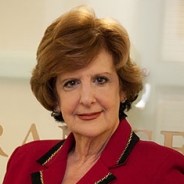
Janice Pringle to Receive Excellence in Patient Care Award
Janice Pringle, founder and director of the University of Pittsburgh School of Pharmacy Program Evaluation and Research Unit, will receive the National Association of Chain Drug Stores Foundation’s Excellence in Patient Care Award.
Pringle will be recognized for her work, which has helped to make a difference in Blair County, Pennsylvania. Pringle’s research helped combat opioid abuse and improved individual and population health outcomes in the county.
Pringle is also a professor of pharmacy and therapeutics in Pitt’s School of Pharmacy. Her research has helped develop health care policy research and briefs that have been used to inform policy development at both the state and federal levels.
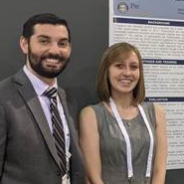
PERU Group Wins ‘Best Professional Abstract’ at Expo
An abstract co-created by the University of Pittsburgh School of Pharmacy Program Evaluation and Research Unit (PERU) won the “Best Professional Abstract” award at the American Public Health Association annual meeting and expo.
The abstract, “Pharmacy Student’s Knowledge and Perceived Competency in Conducting SBIRT for Substance Use Disorders,” was written in collaboration with Heather Santa, senior research specialist at Pitt’s School of Pharmacy, and project partners at the University of the Sciences in Philadelphia. The abstract presented results from a training grant with the University of the Sciences with over 314 student pharmacists trained to proficiency.
The abstract was the highest scoring entry out of 74 abstracts submitted.

Pitt School of Dentistry First to Create Opioid Guidelines
The University of Pittsburgh School of Dental Medicine is the first dental school in the nation to establish opioid-free pain management guidelines for the vast majority of procedures performed in all of its clinics. The guidelines advocate that clinicians prescribe non-opioid pain-relievers first whenever possible.
The Appalachian corridor, which includes Western Pennsylvania, is a hot zone for opioid addiction. With deaths occurring every day from opioid abuse, and costs of rehabilitation care approaching $90,000 per hospitalization, deliberate strategies to minimize dental pain after treatment and eliminate the need for opioid pain relievers are now available to combat this public health crisis in the Appalachian region.
“Pitt Dental Medicine is leading the way with the adoption of this new protocol by teaching our students and residents the best way to manage pain effectively without the unnecessary risk of opioid dependence,” said Bernard J. Costello dean of the School of Dental Medicine. “When these trainees move on to other practices, they’ll take these opioid-free guidelines with them.

New Institute Will Improve Pediatric Health and Research
The Institute of Infection, Inflammation and Immunity in Children—i4Kids for short—is a new strategic research effort focused on improving pediatric health by combating infectious and inflammatory diseases through accelerating new multi-disciplinary collaborations across the health sciences, natural and physical sciences, and computer science.
The institute is being led by John Williams, Henry L. Hillman Endowed Chair in Pediatric Immunology, professor of pediatrics at Pitt and the institute’s director
Infection is the leading cause of death in children under 5-years-old worldwide, and infectious and inflammatory diseases are the leading causes of child hospitalization in the US. i4Kids aims to become the epicenter of research, discovery, prevention and treatment of these diseases in children as the foundation of improving the health of future generations.
The institute will host a launch symposium on Feb. 11, 2020, from 2 to 6 p.m. in the Rangos Research Auditorium at Children’s Hospital. The institute is working with the Children’s Hospital Foundation to invite leaders of foundations and philanthropists across the nation.
For more information on i4Kids, visit their website.

Healthy Lifestyle Institute Hosts Second Annual Summit, Announces ‘Schools on the Move’ Initiative
The Healthy Lifestyle Institute (HLI) hosted its second annual summit on Friday, Dec. 6 on the Pittsburgh campus. The summit consisted of presentations and updates from researchers across campus on their work to transform lifestyle research into health and wellbeing for people in all stages of life.
Housed within the School of Education, HLI was founded in 2017 with a mission “to develop, translate and implement health and wellness programs” for the Pitt community and around the Pittsburgh region.
At the summit, HLI’s founding director John Jakicic (EDUC ’95G), introduced HLI’s Schools on the Move initiative, which will provide grants to support innovative physical activity programming at 43 K-12 schools in the Pittsburgh area.
“We’re asking teachers to get creative. We’re not just providing schools with basketballs and nets,” said Jakicic, who also serves as chair of the Department of Health, Physical Activity, and Exercise in the School of Education. “We’re really interested in seeing how these projects unfold.”

Pitt Nursing Faculty Stand Out in Statewide Awards
Three University of Pittsburgh School of Nursing faculty members were recognized in November at the 30th annual gala and celebration of the Nightingale Awards of Pennsylvania. Each faculty member who was nominated for her category received the award.
Brenda Cassidy (NURS ’86G, ’97G, ’11G), assistant professor, won the Doctorate of Nursing Practice award; Jennifer Lingler (NURS ’98G, ’04G; A&S ’03G), professor, won the Nursing Research award; and Patricia Tuite (NURS ’85, ’92G), assistant professor, won the Nursing Education-Academia award.
The Nightingale Awards are a statewide program designed to recognize excellence in nursing. Over the past 30 years, more than 100 nursing professionals who best exemplify compassionate care, clinical expertise, education and leadership have been celebrated at the awards ceremony.

Grace Campbell Selected for Inaugural National Recognition
Nurse researcher and faculty member Grace Campbell (SOC WK ’85G, NURS ’94,’13G) is among an elite group of nurses included in the inaugural cohort of fellows of the Association of Rehabilitation Nurses (ARN).
Campbell is one of fewer than 20 nurses from across the United States who were selected for this inaugural cohort of fellows. Nurses were selected based on their leadership in rehabilitation nursing, as well as contributions, service and commitment to the specialty and the ARN.
Campbell’s research focuses on the impact of chronic disorders on physical function and developing behavioral interventions to improve physical function. She is specifically interested in fall risk and fall prevention in individuals who are chronically ill, including those who are stroke and cancer patients.
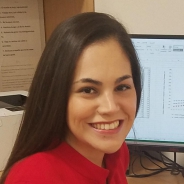
Inmaculada Hernandez Earns Emerging Leader Award
Inmaculada Hernandez, assistant professor of pharmacy and therapeutics in Pitt’s School of Pharmacy, was recently presented the 2019 Seema S. Sonnad Emerging Leader in Managed Care Research Award by the American Journal of Managed Care.
This award recognizes an individual whose early achievements in managed care demonstrate the potential for making an exceptional long-term contribution as a leader in the field.
With over 40 published peer-reviewed manuscripts, Hernandez has contributed to 25 as a first author and eight as a senior author. These articles have been published in various medical journals and their findings have been featured on NPR, Forbes, ABC, CNBC, BBC, Fox News and Bloomberg. Hernandez was also recently included on the Forbes 30 Under 30 list as a young leader in health care research.

Study on Hearing Loss and Social Participation Receives Award
Catherine Palmer, associate professor in the Department of Communication Science and Disorders at Pitt, has been approved for a $2.23 million funding award by the Patient-Centered Outcomes Research Institute (PCORI) to study hearing aids’ role in participation in senior communities.
Through this three-year award, Palmer and her team in the School of Health and Rehabilitation Sciences (SHRS) will find out if people are more satisfied with their social participation when more hearing support is available, and if people with hearing loss find their quality of life improves when they have access to hearing help more frequently.
Palmer’s study was selected for PCORI funding through a highly competitive review process in which patients, clinicians and other stakeholders joined clinical scientists to evaluate the proposals. Applications were assessed for scientific merit, how well they will engage patients and other stakeholders and their methodological rigor among other criteria.
Palmer is also director of the SHRS Audiology Program, director of the Center for Audiology and Hearing Aids at the University of Pittsburgh Medical Center and the current president of the American Academy of Audiology. Other Pitt researchers who will work with Palmer in this study include audiology associate professor Elaine Mormer, occupational therapy associate professor Natalie Leland and physical therapy professor Charity Patterson.

Peter Strick Honored for Brain Research
Peter Strick, founding scientific director of the University of Pittsburgh Brain Institute, was selected for a 2019 Krieg Cortical Kudos Discoverer Award in recognition of his contributions to the understanding of the cortical circuits involved in motor control.
He was presented the award by the Society for Neuroscience at the Cajal Club in Chicago. Each year, neuroscientists at senior, intermediate and beginning stages in their careers are honored by the society for outstanding research on the structure and connections of the cerebral cortex.
Strick's research focuses on four major areas: the generation and control of voluntary movement by the motor areas of the cerebral cortex; the motor and cognitive functions of the basal ganglia and cerebellum; the neural basis for the mind-body connection; and unraveling the complex neural networks that comprise the central nervous system.

Pitt, UPMC to Lead New National Research and Training Center on Family Support
The University of Pittsburgh and UPMC have been selected to create the National Rehabilitation Research and Training Center on Family Support.
Through a $4.3 million grant from the National Institute on Disability, Independent Living, and Rehabilitation Research (NIDILRR), the center will serve as a national hub that leverages state-of-the-art research to improve the care, health and quality of life of all persons with disabilities and the families who support them.
The center, which builds upon 30-plus years of Pitt’s efforts in support of caregiving, is directed by Heidi Donovan, professor in the School of Nursing’s Department of Health and Community Systems; Scott Beach, interim director and director of survey research of the University Center for Social and Urban Research; and Bambang Parmanto, professor and chair of Pitt’s Department of Health Information Management in the School of Health and Rehabilitation Sciences.
“The need nationwide for this center is huge. Despite the important role that caregivers provide to our health system, there are still gaps in knowledge in the field of family caregiving,” said Gabriela Prudencio, Hunt Research Director at the National Alliance for Caregiving. “Pitt and UPMC bring over 30 years of extensive research experience in this field and have been leveraging key relationships to translate research into programs and policies.”

School of Health and Rehabilitation Sciences Celebrates 50th Anniversary
The University of Pittsburgh School of Health and Rehabilitation Sciences (SHRS) turns 50 this year.
The school began as one of the smallest schools on Pitt’s campus in 1969 and has grown to be one of the most prominent today.
“We are fortunate that the leadership in SHRS sees the challenges as opportunities to demonstrate our collective innovativeness in educational delivery. This is especially evident as we boldly move into the arena of distance education,” said Anthony Delitto, who has served as the school’s dean since 2015.
Read more about the school over its half-century existence in the latest edition of FACETS, SHRS’ magazine.
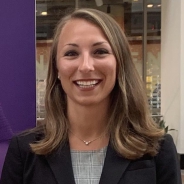
Alum Lia Winter Finalist in Innovation Competition
Lia Winter (ENGR ’17) was recently a finalist in the 2019 Collegiate Inventors Competition.
Winter’s entry is a trademarked patent of hers, the EasyWhip, a double-loop stitching apparatus that leverages removable, connected needle portions, resulting in a new whip stitching method that improves graft accuracy, reduces the need for costly revision surgeries and provides better overall outcomes for patients.
While studying bioengineering at Pitt for her undergrad work, she also volunteered in cancer research at the former Pitt Summer Academy, investigating the use of native immune cells to induce cell-mediated autophagy as a cancer therapy.
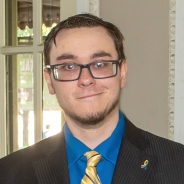
Autism Awareness Advocate Timothy Grebeck Wins Thornburgh Forum Award
Graduate student Timothy Grebeck began educating those around him about what it was like to have an autism spectrum disorder (ASD) when he was in the seventh grade at a regional school. Diagnosed with ASD at age nine but tired of being bullied, he says he chose as a young teen to devote his life to make sure others like him didn’t suffer the same way. Grebeck (EDUC ’19) is currently a graduate student at Pitt studying childhood and special education in the School of Education and the founder of the advocacy group Talking 4 Autism. Recently he was presented with the 2019 Dick Thornburgh Forum Disability Service Award, at a ceremony in the William Pitt Union Lower Lounge. It’s an annual honor from the Dick Thornburgh Forum on Law & Public Policy.
“Changing the world for the better starts with changing the viewpoint of just one person,” said Ginny Thornburgh, as she handed Grebeck a check for $5,000 for his future work.
Through Talking 4 Autism, Grebeck provides intimate personal presentations about the world of autism to college students and faculty as well as corporate employees. “I expect and encourage people to ask things that are uncomfortable to talk about because that is how we all learn,” he said.
The award ceremony's keynote speaker was Ted Kennedy, Jr., chair of the board of the American Association of People with Disabilities. Listen to Kennedy’s keynote speech.

